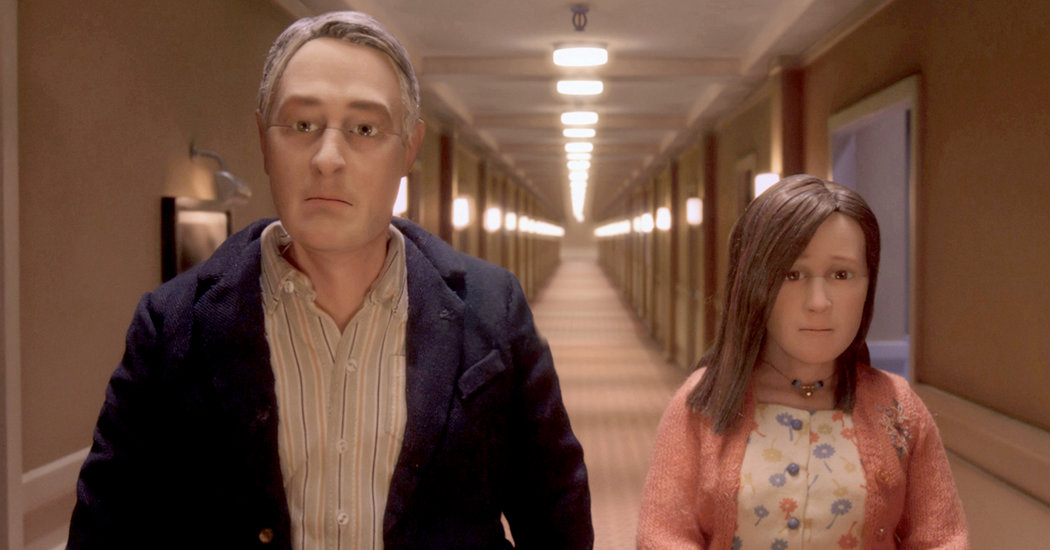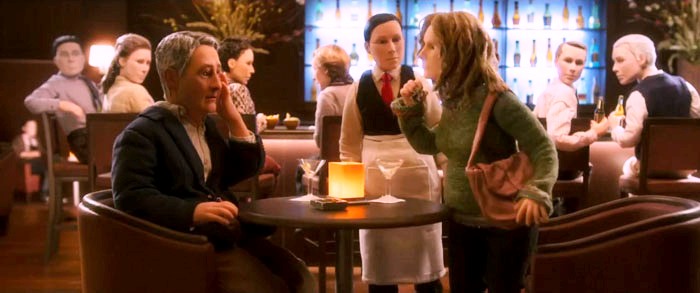As a follow up to 2008’s Synecdoche. New York, director Charlie Kaufman’s Anomalisa can seem a bit disappointing. I’m not sure this is totally the fault of Anomalisa, since Synecdoche is one of the great films of the last decade (sometimes I think of all time, but that’s a long list): Synecdoche is complex, layered and constantly folding over on itself, a wholly ambitious film that works on every single level. Topping it would be nearly impossible and, in some ways Kaufman, along with co-director Duke Johnson, aren’t really trying to. What they’ve created is an incredibly simple movie, something that’s almost the opposite of Synecdoche, with only a handful of characters and a plot that’s simple and unfussy.
Based on Kaufman’s play of the same name, it’s a deep and resounding examination of the search for human connection. The film’s stop-motion animation adds distinct visual style to a story that can feel bare at times. The film is about Michael (voiced by David Thewlis), an author, public speaker and customer-service guru (not to mention married man) who — while on a business trip — meets Lisa (voiced by Jennifer Jason Leigh), a quiet, awkward and slightly disfigured woman who’s a fan of Michael’s books. Michael quickly finds himself charmed by and deeply attracted to this quiet woman, though the root of his desires — a profound sense of loneliness and a desperate need for human connection — render his feeling toward Lisa insincere, something neither of them seems to want to admit, or possibly realize.
That’s basically it. It’s pretty straightforward. Other than one dream sequence, an antique Japanese sex doll and the fact that the rest of the characters are voiced by the same person (Tom Noonan), there’s nothing terribly strange or noteworthy in the film, at least when you consider Kaufman’s pedigree. There is also a lot of buildup to Anomalisa’s main point, and once it’s made, there’s very little else left.
But there is something innately — and perhaps uncomfortably — human in Kaufman and Johnson’s little puppets and their need just to find solace in others, even if it means humiliation in the process.
This notion is perhaps the most fascinating part of Anomalisa — although not simply within the context of film, but because of where the idea fits in Kaufman’s filmography, specifically in relation to Synecdoche. That film was about theater director Caden Cotard (Philip Seymour Hoffman) attempting to find brutal truth in the mundane (“None of these people are an extra. They’re all the leads of their own story,” he says at one point while considering the world at large) — a perfectly apt sentiment for Kaufman’s latest offering. Anomalisa could be one of Cotard’s plays within a play within a play of everyday life, literally in miniature, as depicted by Kaufman and Johnson’s puppets. What’s more, there’s a scene in Synecdoche when a minister — in the middle of a long monologue — comments, “And so you spend your time in vague regret or vaguer hope that something good will come along. Something to make you feel connected, something to make you feel whole, something to make you feel loved” — which sums up Anomalisa perfectly. Viewed in this light, as an appendage to Synecdoche, the film becomes a bit more fascinating than its quiet, ribald facade suggests. Rated R for strong sexual content, graphic nudity and language.








Anybody see this one?
It’s actually made it here to Green Bay, so I’m going to try to catch it before it leaves again next week.